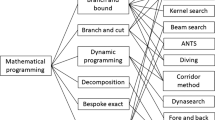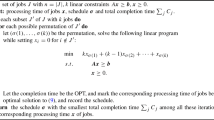Abstract
In this paper we consider the familiar bin-packing problem and its associated set-partitioning formulation. We show that the optimal solution to the bin-packing problem can be no larger than 4/3 ⌈Z LP⌉, whereZ LP is the optimal solution value of the linear programming relaxation of the set-partitioning formulation. An example is provided to show that the bound is tight. A by-product of our analysis is a new worst-case bound on the performance of the well studied First Fit Decreasing and Best Fit Decreasing heuristics.
Similar content being viewed by others
References
K.L. Hoffman, M. Padberg, Solving airline crew scheduling problems by branch-and-cut, Management Science 39 (1993) 657–682.
M. Desrochers, J. Desrosiers, M. Solomon, A new optimization algorithm for the vehicle routing problem with time windows, Operations Research 40 (1992) 342–354.
J. Bramel, D. Simchi-Levi, On the effectiveness of set partitioning formulations for the vehicle routing problem with time windows, Operations Research 45 (1997) 295–301.
L. Wolsey, Heuristic Analysis, Linear programming and branch and bound, Math. Prog. Study 13 (1980) 121–134.
D. Shmoys, D. Williamson, Analyzing the Held-karp TSP bound: a monotonicity property with application, Information Processing Letters 35 (1990) 281–285.
M.X. Goemans, D.J. Bertsimas, Survivable networks, linear programming relaxations and the parsimonious property, Mathematical Programming 60 (1993) 145–166.
E.G. Coffman Jr., M.R. Garey, D.S. Johnson, Approximation algorithms for bin-packing: a survey, in: D. Hochbaum (Ed.), Approximation Algorithms for NP-Hard Problems, PWS Publishing, Boston, 1997, pp. 46–93.
D.S. Johnson, A. Demers, J.D. Ullman, M.R. Garey, R.L. Graham, Worst-case performance bounds for simple one-dimensional packing algorithms, SIAM Journal on Computing 3 (1974) 299–325.
M.R. Garey, R.L. Graham, D.S. Johnson, A.C. Yao, Resource constrained scheduling as generalized bin-packing, J. Combinatorial Theory Ser. A 21 (1976) 257–298.
D. Simchi-Levi, New worst-case results for the bin-packing problem, Naval Research Logistics 41 (1994) 579–585.
B.S. Baker, A new proof for the first-fit decreasing bin-packing algorithm, J. Algorithms 6 (1985) 49–70.
M. Yue, A simple proof of the inequalityFFD(L)≤11/9 OPT(L)+ 1, ∀L, for the FFD bin-packing algorithm, Acta Math. App. Sinica 7 (1991) 321–331.
Author information
Authors and Affiliations
Corresponding author
Additional information
This research was supported in part by ONR Contracts N00014-90-J-1649 and N00014-95-1-0232, and NSF Contracts DDM-8922712 and DDM-9322828.
Rights and permissions
About this article
Cite this article
Chan, L.M.A., Simchi-Levi, D. & Bramel, J. Worst-case analyses, linear programming and the bin-packing problem. Mathematical Programming 83, 213–227 (1998). https://doi.org/10.1007/BF02680559
Received:
Revised:
Issue Date:
DOI: https://doi.org/10.1007/BF02680559




